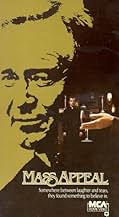IMDb RATING
6.7/10
1.2K
YOUR RATING
A popular Connecticut priest shields a seminary rebel from the wrath of a stern monsignor.A popular Connecticut priest shields a seminary rebel from the wrath of a stern monsignor.A popular Connecticut priest shields a seminary rebel from the wrath of a stern monsignor.
- Awards
- 1 win
Storyline
Did you know
- TriviaAccording to actor Zeljko Ivanek, the fish sermon scene was shot 15 times from three different angles. Although Ivanek considers the last take the best, most of it didn't make the final cut because it was too emotionally jarring for the audience.
- Quotes
Father Tim Farley: You're a lunatic! And Christ NEEDS lunatics. But the trouble with lunatics is, they don't know how to survive.
- Crazy creditsThis picture is dedicated to the memory of Ray A. Kroc.
- ConnectionsFeatured in At the Movies: Dune/Starman/Mass Appeal/Runaway (1984)
Featured review
Pity the poor congregation of St. Francis Parish, subject to "dialogue sermons" (what???), autobiographical psycho-babble and in the end, self-righteous calls to rise up against the local Church hierarchy. If things are really like this in the Catholic Church today, its enough to make this lapsed Catholic stay that way for a long time. That said, and hoping that this does not mirror reality, the movie works as entertainment, largely due to the performances of the two main characters. Jack Lemmon is delightful and convincing as a lonely priest who has found strategies (some decent ones, some hurtful) to survive who takes on the task of mentoring and tempering the well-meaning but naive passions of a young seminarian, also well played. The big casualty is in the one-dimensionality of the "heavy" played by Charles Durning, and perhaps of all of his cronies as well. Well, Catholic bashing is nothing new, mostly by ex-Catholics, but it always diminishes the dialogue such issues could provoke. However, there is more to the movie than this, especially in some very good characterizations of Catholic lay people, Louise Latham's housekeeper in particular.
- How long is Mass Appeal?Powered by Alexa
Details
- Release date
- Country of origin
- Language
- Also known as
- Die Auseinandersetzung
- Filming locations
- Claremont, California, USA(myself, as I was an extra in this film)
- Production companies
- See more company credits at IMDbPro
Box office
- Budget
- $7,000,000 (estimated)
- Gross US & Canada
- $1,945,658
- Gross worldwide
- $1,945,658
Contribute to this page
Suggest an edit or add missing content























